Introduction
When writers use irony, they say one thing and mean something very different. It should not surprise you then that irony causes more trouble for inexperienced readers than anything else. Spoken irony is easier to understand than written irony. A speaker can signal irony with a change in tone or with body language; the speaker’s voice may become sour, sarcastic, or dry, and she may move or gesture in a way that is deadpan, solemn, or neutral. A parent might say ironically to a child with a messy room, “My, what a great job of decorating you’ve done,” or “I can see you’ve been hard at work straightening your room.” Of course, the parent is really saying that the room needs cleaning. The child understands the parent’s message from the parent’s tone and body language as much as through the words the parent actually says. When we read, we can’t hear the writer’s or characters’ tone of voice or see their body language. To recognize written irony, we have to pay close attention to the context of the passage and the subject and purpose of the entire piece.
If irony makes the writing harder to understand, you might wonder why people use it. Perhaps it’s because irony is said to
- capture the difference between what is and what might be.
- remind us that life doesn’t always measure up to our expectations.
- reflect the ambiguities and complexities of life.
- reveal the truth or at least focus our attention on it.
- make readers work harder and thus intensify the effect of the message.
- compliment intelligent readers by inviting them into an exclusive club of people—those who get it.
Learning to read and appreciate irony is the ultimate test of your skill at reading between the lines, and can take considerable practice. This lesson will help you acquire the skills to figure out puzzling or ambiguous statements and situations and will initiate you into the club of readers who get it.
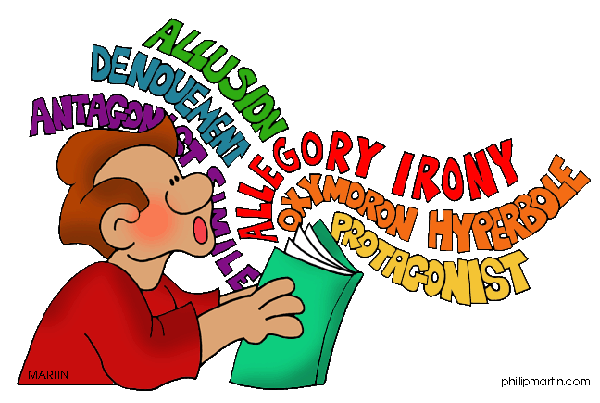
Instructions for Using the Take Notes Tool
- Click the Take Notes button in the left Epsilen navigation menu to open the Take Notes popup page.
- You may edit the Title or leave it as the title of the course.
- Enter your notes in the Content box.
- Click the Save button. You may now refer to these notes whenever you open the Take Notes popup page.
Recognizing Irony in Cartoons and Charts
As you do this activity, keep in mind the second definition of irony: “incongruity between what might be expected and what actually occurs; an occurrence, result, or circumstance notable for such incongruity.” In the following cartoons, determine what is incongruent—ironic—about each situation. Also, consider what truth(s) the cartoonist is addressing.
Here is an example of irony from cartoonist Mark Anderson.
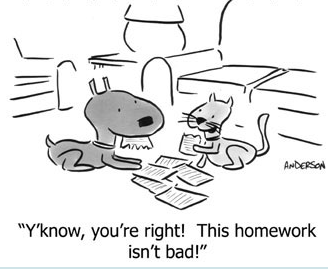
The irony in this cartoon stems from a cliched excuse we’ve all heard at least once: “My dog ate my homework.” As soon as someone utters this claim, we know it’s untrue. The scene is ironic and funny only because it is remarkably incongruent with our understanding of that excuse. Not only is this dog eating some poor student’s homework, but it’s also helping the cat develop a taste for such a meal.
The picture below demonstrates another example of irony. Analyze it using your Take Notes Tool. Considering the picture and the caption as a whole, explain how this graphic is incongruent with our expectations. When you’re finished, check your understanding.
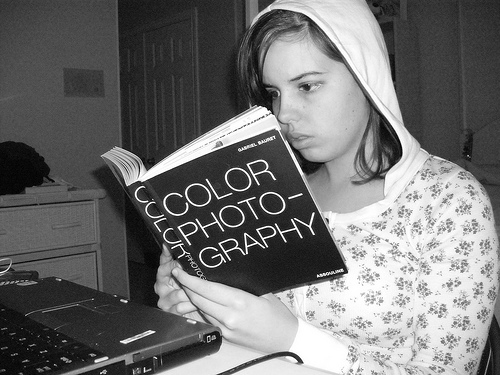
The book cover in the picture reads “Color Photography,” but the picture is black and white. It seems like a reasonable expectation that the picture would be in color given the book cover.
CloseDetermining What Irony Is and Isn’t
In 1995, pop singer Alanis Morissette released a song called “Ironic.” Ever since its release, people have criticized her for not knowing what irony is. She calls many things ironic in the song, and some say that her examples aren’t ironic at all. Genuine irony is different from everyday bad luck and sad, annoying experiences. Does Morissette misuse the word “irony” when she applies it to certain coincidental events?
As you do this exercise, remember that the term “irony” includes those occurrences that are notably incongruent with our expectations. A coincidence is slightly different: “an occurrence of two or more events at one time apparently by mere chance.” Some coincidences are ironic, but not all. Here are examples from Morissette’s “Ironic” that are not in themselves ironic:
- “It’s a free ride when you’ve already paid.” This is just bad timing, no matter how annoying.
- “It’s a traffic jam when you’re already late.” Same as the above.
Here are examples from the song that are ironic:
- “Mr. Play It Safe was afraid to fly/He packed his suitcase and kissed his kids goodbye/He waited his whole . . . life to take that flight/And as the plane crashed down. . . .” The man who is fearful of flying dies in a plane crash when he finally overcomes his fear. This is the notable incongruity that makes the example ironic.
- “ . . . he thought/’Well, isn’t this nice . . .’” These words, thought by Mr. Play It Safe as he tumbles from the heavens, are notably opposed to the truth—it is anything but “nice” to die in a plane crash.
- “An old man turned ninety-eight/He won the lottery and died the next day.” If we win the lottery, we not only expect to have a good time, but also expect to have a fantastic life. Death is incongruent with our expectations.
Now choose either “Ironic” or “Not Ironic” for each item. Hint: There are five examples of irony and non-irony.
Distinguishing Three Types of Irony in Literature
Many of our greatest works of literature are filled with examples of irony, making it important for you to learn how it is used. Here are definitions of three commonly recognized types of irony:
- Situational irony: a literary technique for implying, through plot or through character, that the actual situation is quite different from that presented; situational irony involves an incongruity between what is expected or intended and what actually occurs.
- Dramatic irony: a dramatic device in which a character says or does something that he or she does not fully grasp but that is understood or strongly suspected by the audience.
- Verbal irony: the use of words in which the intended meaning is contrary to the literal meaning.
The examples in this exercise come from three well-known American novels—The Scarlet Letter by Nathaniel Hawthorne (1850), The Adventures of Huckleberry Finn by Mark Twain (1884), and The Great Gatsby by F. Scott Fitzgerald (1925)—and one familiar American play, The Crucible by Arthur Miller (1953).
Here are synopses of the works from Wikipedia to help you remember the stories or introduce you to them if you have not read them:
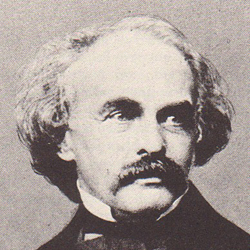
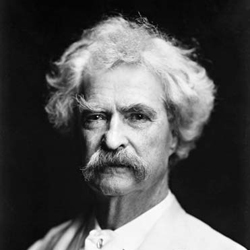
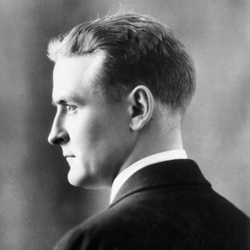

Examples of Types of Irony from the Above Works
| Type of Irony | Examples | Explanation |
|---|---|---|
SituationalA literary technique for implying, through plot or character, that the actual situation is quite different from that presented; it involves an incongruity between what is expected or intended and what actually occurs. 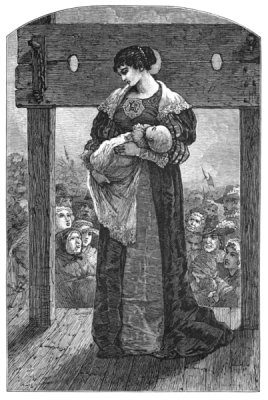
|
||
| Scarlet Letter: Roger Chillingworth, Hester’s husband, is trained as a healer and is very good at it, yet he dedicates his life to destroying another person. | People expect doctors and healers to make people well. Chillingworth does everything he can to destroy his rival both physically and emotionally. | |
| Huckleberry Finn: Huck and Jim’s escape to freedom up the river is destroyed when they miss the fork in the river in the fog (Ch. 15) and travel the wrong way on the river back into the Deep South, back into slave country. | No one expects Huck and Jim to end up back in slave country when they have gone through so much to get to the free states. | |
| Great Gatsby: Hundreds of people attended Gatsby’s lavish parties; only a handful attend his funeral. | After appearing so popular, it seems surprising that Gatsby’s funeral is sparsely attended. His popularity was based on superficiality rather than friendship. | |
| The Crucible: Rebecca Nurse, one of the most respected older members of Salem, is arrested “’For the marvelous and supernatural murder of Goody Putnam’s babies.’” (Act 2, 69) | In the play (and the historical records), it is shocking that a pillar of the community such as Rebecca Nurse, always a fine model for others, can be arrested and executed for a crime no one can even prove happened. | |
DramaticA dramatic device in which a character says or does something that he or she does not fully grasp but is understood or strongly suspected by the audience. 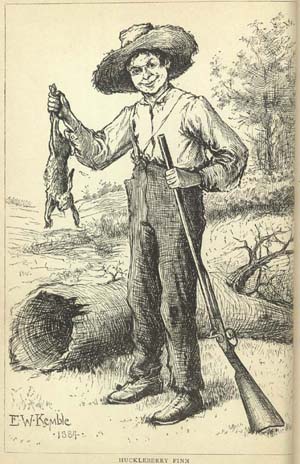 |
||
| Scarlet Letter: [Early in the novel when Hester is being punished and questioned by the authorities, Governor Bellingham directs Dimmesdale to demand that Hester name the man who is her co-sinner.] “’Good Master Dimmesdale,’ said he, ’the responsibility of this woman’s soul lies greatly with you.’” (Ch. 3, 47) | Even a first-time reader of this novel by this point should be strongly suspicious of the minister and knows that he is the “co-sinner” and father of the infant—responsible for much more than Hester’s soul. | |
| Huckleberry Finn: [Huck is at the circus, watching a “drunk” trying to ride a horse. Everyone in the audience except Huck knows this man is an expert rider and only pretends to be drunk to entertain the crowd.] “It warn’t funny to me, though; I was all of a tremble to see his danger. But pretty soon he struggled up astraddle and grabbed the bridle, a-reeling this way and that; and the next minute he sprung up and dropped the bridle and stood! And the horse a-going like a house afire, too. He just stood up there, a-sailing around as easy and comfortable as if he warn’t ever drunk in his life . . .” (Ch. 22, 206) | The circus audience, as well as readers of the novel, understand what Huck cannot because Huck isn’t familiar with this kind of circus act. The “drunk” is not really drunk, and Huck can’t understand why people in the crowd react the way they do. | |
| Great Gatsby: Jay Gatsby has built his great wealth through criminal activity but believes it’s okay because his goal is based on pure love. | The reader learns fairly quickly that the object of Gatsby’s love, Daisy, is not worthy of such devotion, that she, too, is corrupt. | |
| The Crucible: John Proctor’s faithfulness to his religion is being questioned. Asked to list the 10 Commandments, he names 9 of them, forgetting the commandment against adultery; his wife Elizabeth gently reminds him of it. (Act 2, pp. 64-65) | The reader knows by this time that Proctor has committed adultery—he forgot the commandment that he has defied. His wife, instead of raging at him for his unfaithfulness, provides the answer, trying to protect him. | |
VerbalThe use of words in which the intended meaning is contrary to the literal meaning 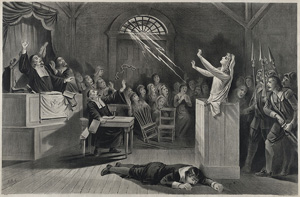 |
||
| Scarlet Letter: “Into this festal season of the year . . . the Puritans compressed whatever mirth and public joy they deemed allowable to human infirmity; thereby so far dispelling the customary cloud, that, for the space of a single holiday, they appeared scarcely more grave than most other communities at a period of general affliction.” (Ch. 21, 155) | Hawthorne says that these people, even when they are celebrating, still appear to be suffering, that their happiest day is like another community’s worst day. | |
| Huckleberry Finn: [at a funeral] “ . . . and every woman, nearly, went up to the girls, without saying a word, and kissed them, solemn, on the forehead, and then put their hand on their head, and looked up towards the sky, with the tears running down, and then busted out and went off sobbing and swabbing, and give the next woman a show. I never see anything so disgusting.” (Ch. 25, 227) | Huck’s description of the women’s behavior at first seems sympathetic, but his comment at the end forces the reader to reconsider. The women’s behavior is not sincere; it is more to prove who is the best at putting on a “mourning” show. | |
| Great Gatsby: [At a dinner party early in the novel, Daisy is telling her cousin Nick a story. Nick came to meet Daisy’s cousin.] “’I’ll tell you a family secret,’ she whispered enthusiastically. ’It’s about the butler’s nose. Do you want to hear about the butler’s nose?’ [Nick replies.] ’That’s why I came over tonight.’” (Ch. 1, 14) | Nick’s response to Daisy’s absurd story is the opposite of why he came to the dinner party at Daisy’s house; of course, he did not come to hear anything about the butler’s nose. He came because Daisy is a cousin, and he has just moved from the Midwest to Long Island and wants to start meeting people. | |
| The Crucible: [Stage Direction] Enter Mercy Lewis, the Putnams’ servant, a fat, sly, merciless girl of eighteen. (Act 1, 14) | Mercy Lewis proves to be anything BUT merciful—as Miller’s stage direction notes. She’s a “fat, sly, merciless girl” as she will prove later in the story. |
To make sure you understand the three types of irony in the chart, read the exercise that follows and determine which type of irony best represents each passage. You should be able to decide the type of irony even if you haven’t read the work. (Note: Some of these examples could represent more than one, but choose the most appropriate answer.) Use your Take Notes Tool to write your answers. When you’re finished with each one, check your understanding.
1. In The Scarlet Letter, Hester makes a public confession of her sin and bears her punishment gracefully as the community scorns her; Dimmesdale, her co-sinner, grows increasingly popular in the community.
- Verbal
- Dramatic
- Situational
The correct answer is C, situational, because Hester and Dimmesdale commit the same sin. Hester suffers ostracism; Dimmesdale attains a status almost as high as a saint’s. There is no verbal irony here because nothing means the opposite of what is said. It is not dramatic irony because it’s not about reader knowledge or character ignorance. It’s an observation about the situations of the characters.
Close2. Near the end of Huckleberry Finn, Tom Sawyer forces Huck and Jim into a ridiculous scheme to set Jim free. Tom gets shot in the leg in the process. When Huck gets Tom to the doctor, the doctor asks how he got shot. Huck replies, “’He had a dream, and it shot him.’ The doctor says, ’singular dream.’” (Ch. 41, 383)
- Verbal
- Dramatic
- Situational
The correct answer is A, verbal. When the doctor says “singular dream,” he is most obviously remarking on the unique nature of the dream that shot Tom—as if such a thing could actually have happened. Although the doctor really knows this isn’t the case (because no dream could shoot someone), he speaks as if he takes Huck at his word. The doctor resigns himself to verbal irony, probably because he is unsure of the circumstances and doesn’t want to appear nosy about what happened. It isn’t dramatic or situational irony because the readers and the characters, other than the doctor, know what is going on.
Close3. In The Crucible, the primary purpose of the Salem theocracy was to maintain community stability, but during the witch trials, Salem descended into utter disarray.
- Verbal
- Dramatic
- Situational
The correct answer is C, situational, because the expectation is that a society governed by religion will not succumb to hysteria and allow innocent people to be killed based upon nothing but outrageous accusations. There is no verbal irony here because nothing said is the opposite of what is meant. And there is no dramatic irony here because everyone knows what happened. It is the situation itself that is incongruent with people’s expectations.
Close4. In The Great Gatsby, after Gatsby and Daisy have finally met again after five years, Nick comments, “There must have been moments even that afternoon when Daisy tumbled short of his dreams—not through her own fault, but because of the colossal vitality of his illusion” (97).
- Verbal
- Dramatic
- Situational
The correct answer is B, dramatic, because the reader knows that another person cannot make another person perfectly happy, least of all Daisy; it is humanly impossible because all people are flawed. Gatsby has pinned all his hopes on a flawed woman and the perceptive reader knows it. It isn’t verbal irony because no speakers here mean other than what they are saying. And it isn’t situational because the reader expects Gatsby will find that reality isn’t the same as a dream.
Close5. In The Great Gatsby, Daisy tells Nick, “’I’m p-paralyzed with happiness’” (Ch. 1, 9) (Nick has just spent time with Daisy’s husband Tom and has already decided that Tom is harsh, cruel, and arrogant.)
- Verbal
- Dramatic
- Situational
The correct answer is A, verbal, because Daisy is not happy. It’s not dramatic because Nick has already figured out what a brute Tom is, and it’s not situational because Daisy’s situation is not the opposite of our expectations.
Close6. In The Crucible, John Proctor is desperately trying to save his wife Elizabeth from being hanged as a witch. Their maid Mary Warren could tell the truth and save her. He says to her, “’Do that which is good, and no harm will come to thee’” (Act 3, 90). [Many people who have done “good” have already been arrested.]
- Verbal
- Dramatic
- Situational
The correct answer is B, dramatic. Just because people have been good throughout their lives, it doesn’t protect them. Mary Warren might save Elizabeth, but she will call down the wrath of the vengeful, spiteful girls who have been accusing anyone they don’t like of being witches. It’s not verbal irony because nothing Proctor says is the opposite of what he means. And it’s not situational because events are unfolding as expected.
Close7. In Huckleberry Finn, the Shepherdson and Grangerford families who have been feuding for generations and have murder in their hearts, sit in the same church and listen sympathetically to a sermon about brotherly love.
- Verbal
- Dramatic
- Situational
The correct answer is C, situational because both sides of the feud sit together in church and agree with the sermon that they should love one another, yet they leave and then keep murdering one another. They don’t even remember why they are feuding in the first place.
CloseAnalyzing Irony in a Poem
In the following poem, Thomas Hardy, English novelist and poet of the late nineteenth to early twentieth centuries, makes use of irony to convey the speaker’s attitude toward a relationship. As you read “Neutral Tones,” try to determine what is ironic and how it makes you not only understand but also feel the speaker’s words.

© chelthan2006
Neutral Tones
By Thomas Hardy
We stood by a pond that winter day,
And the sun was white, as though chidden of God,
And a few leaves lay on the starving sod;
—They had fallen from an ash, and were gray.
Your eyes on me were as eyes that rove
Over tedious riddles of years ago;
And some words played between us to and fro—
On which lost the more by our love.
The smile on your mouth was the deadest thing
Alive enough to have strength to die;
And a grin of bitterness swept thereby
Like an ominous bird a-wing . . .
Since then, keen lessons that love deceives,
And wrings with wrong, have shaped to me
Your face, and the God-curst sun, and a tree,
And a pond edged with grayish leaves.
Answer these questions about the poem using your Take Notes Tool. Check your understanding after each question.
1. Consider the title. Why is it ironic?
There is nothing neutral about the speaker’s attitude towards the relationship.
Close2. How do these diction choices contribute to the meaning of the poem—stood, pond, winter, white, chidden, few, lay, starving, sod, ash, gray?
They connote stagnation, death, anger—symbolizing the “dead” relationship.
Close3. How does the switch from first-person plural point of view to second-person point of view at the beginning of the second stanza make you feel?
It feels like someone is accusing me directly or pointing at me; nervous, anxious, put on the spot.
Close4. When the speaker says, “Your eyes on me were as eyes that rove/Over tedious riddles of years ago,” what had their past relationship been like, the times they were together before this meeting at the pond in winter?
They had argued or bickered constantly and didn’t forget the arguments or resolve conflicts.
Close5. The word “rove” carries a certain connotation that might tell you something more about this relationship. What might that be?
She might have had a “roving eye”—cheated on the speaker.
Close6. What does the speaker mean by “some words played between us to and fro”? What kind of conversation do they have here by the pond in winter?
They talk about nothing, about trivialities—probably one of the problems they had in their earlier relationship. They don’t truly communicate.
Close7. What do you think that line means—“On which lost the more by our love”?
Possibly the speaker is nostalgic for a time when their words meant something and they were in love. The empty conversation reminds him of what they have lost.
Close8. In the third stanza, if “The smile on your mouth was the deadest thing/Alive enough to have strength to die,” then what is left?
Nothing. It’s over.
Close9. What lesson has the speaker learned?
That love deceives.
Close10. Why is the poem ironic?
The speaker cannot let go of the relationship or his bitterness. There is nothing neutral about his feelings at all. Almost all of the meanings of the word “neutral” are the opposite of this speaker’s feelings: disengaged, peaceful; impartial, unbiased; disinterested, dispassionate, indifferent; objective, detached, removed. What isn’t ironic is another meaning of the word “neutral”—colorless, hueless, pale, washed-out, drab—all terms that describe the status of the relationship.
CloseResources
Resources Used in this Lesson: Bibliography
Fitzgerald, F. Scott. The Great Gatsby. New York: Charles Scribner’s Sons, 1925.
Hardy, Thomas. “Neutral Tones.” Reprint of the 1919 Macmillan edition, Project Gutenberg.
Hawthorne, Nathaniel. The Scarlet Letter. 3rd ed. New York: W.W. Norton, 1961.
Miller, Arthur. The Crucible. New York: Bantam, 1970.
Morissette, Alanis and Glen Ballard. Jagged Little Pill. June 13, 1995. Beverly Hills: Maverick Records, 1995.
Twain, Mark. The Adventures of Huckleberry Finn. New York: Harper & Brothers, 1931.